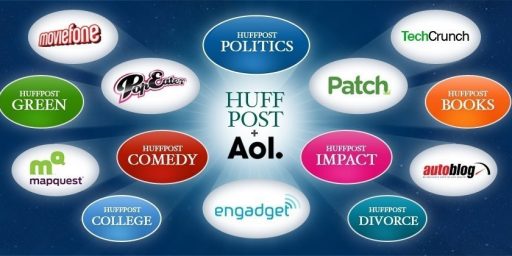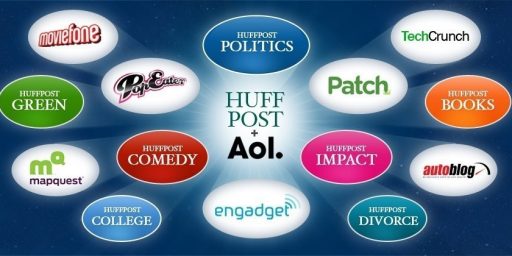Is HuffPo Worth $315 Million?
Reacting to this morning’s news that AOL bought Huffington Post for $315 million, tech entrepreneur Aaron Brazell jokes, “AOL, 2006 Called and Wants Its Content Commoditization Strategy Back.”
It was a deja vu kind of moment this morning as I saw the stereotypical business model of the mid-2000s flash before my eyes. In those days, everyone thought they could make money purely on advertising and content. Crank out the content, get more eyeballs, get more ad dollars, PROFIT!
The problem was (and still is!) is that the more content that is produced, the less valuable it becomes. It’s really very simple economics.
[…]
The problem with the b5media model, along with the Weblogs Inc model that sold (ironically also to AOL), the Gawker model, the Glam model, and now the AOL model, is that the content quality sucks. When I pick up a magazine or newspaper, I would not liken most media to The Atlantic or The New Yorker, both of which are highly intelligent publications that put out content that is exceptionally tuned and academic. The quality of the content is orders of magnitude higher than most newspapers or magazines (obviously including this blog).
Those publications are rare and can get private money from subscriptions, etc. The advertising route is the cheap route, and the route that business models go when they aren’t good enough to charge for access (a more reliable revenue source).
For the record, commodity business don’t normally pay their writers anything comparable to what their “colleagues” at uncommoditized media organizations get paid. That’s because, their work is not valuable unless it is in bulk.
I’d agree with all of that except to note that The Atlantic and New Yorker have traditionally not been very profitable, either. With the notable exception of certain classes of business news and other insider information aimed at a niche audience, people just aren’t willing to pay for content. And that’s more true than ever as the sheer volume of quality content at our fingertips explodes.
Reuters’ Felix Salmon defends the deal, however:
The $315 million that AOL is paying for the Huffington Post is roughly 3X the valuation seen at its last capital raise two years ago, is 10X its 2010 revenues and is roughly 5X estimated forward 2011 revenues. Those are all big numbers, but not insanely so, for what is clearly a big strategic move on the part of AOL. After all, AOL has a market cap of $2.3 billion: right now it still dwarfs HuffPo. That might not be true in a few years’ time, if HuffPo continues growing at its current rate and AOL continues to lose subscribers and revenues.
My feeling, then, is that this deal is a good one for both sides. AOL gets something it desperately needs: a voice and a clear editorial vision. It’s smart, and bold, to put Arianna in charge of all AOL’s editorial content, since she is one of the precious few people who has managed to create a mass-market general-interest online publication which isn’t bland and which has an instantly identifiable personality. That’s a rare skill and one which AOL desperately needs to apply to its broad yet inchoate suite of websites.
And Jeff Jarvis thinks AOL is buying more than content, too:
Content alone isn’t enough for Aol. It has content. Lots. What HuffPo and Arianna bring is a new cultural understanding of media that is built around the value of curation, the power of peers, the link economy, passion as an asset, and celebrity as a currency. As a friend of mine reminds me via email from London, HuffPo, thanks to its roots, also has a keen understanding of the value of technology innovation to build platforms. Unlike old media companies, HuffPo groks scale.
And let’s not forget that HuffPo gets journalism. I remember a few years ago when Alan Rusbridger, editor-in-chief of the Guardian, goaded Arianna in a talk before his staff about why she’d possibly want such as them: reporters who cost a lot and are pains to work with. Because their stories get more traffic, Arianna replied. She understands the value of reporting.
Ultimately, Jarvis contends, “If this acquisition works, it will be because Arianna really is the boss of content and gets to scale her vision and because Aol brings its key strengths-ad sales and capital-to what comes next.” Whatever the hell that might be.







HuffPo is worth whatever AOL, or anyone else, is willing to pay.
Whether that turns out to be a wise decision in the long run is another question.
Here’s the bottom line:
When a corporation is over-capitalized, the money they spend isn’t real money.
Consider in microcosm a company that goes public and from a few million to a billion in market value. How much of that is real and how much is hype? The CEO may know that some good part of it is hype, and so he goes on an acquisition campaign buying companies for umpty-ump million dollars, but delivering only over-priced stock.
AOL isn’t the typical over-flush IPO, but perhaps they know their market valuation is high, and it can’t last … so spend it while spending is good.
I do think it’s a mistake to let Arianna record all the Moviefone listings though.
JP: Interesting rationale — and plausible. They’re paying most of it in cash rather than stocks but, presumably, they’re getting the cash by selling off overvalued stock.
There was a story recently that a majority of AOL’s income was from “dead” or “superfluous” (people having cable) accounts rolling over. If true they need a growth path, and perhaps even more importantly a growth story.
It may actually be a good business plan to milk those AOL accounts on automatic credit card billing and do no more … but it’s kind of embarrassing.